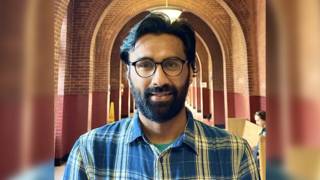
Guests
- Erin Kinggynecologist and executive director of Hope Clinic for Women in Granite City, Illinois.
- Alexa Kolbi-Molinassenior staff attorney at the ACLU Reproductive Freedom Project.
As states around the country ramp up their attacks on reproductive rights, the Supreme Court on Tuesday declined to rule on an Indiana law that would bar abortions based on the sex, race or disability of the fetus. The decision will keep in place a lower court’s injunction on the measure. However, the Supreme Court decided to allow Indiana’s so-called fetal burial law to go into effect, which stipulates that abortion clinics must dispose of fetal remains either through burial or cremation. The measure was signed into law by then-Governor Mike Pence in 2016. We speak with Alexa Kolbi-Molinas, senior staff attorney at the ACLU Reproductive Freedom Project, about the significance of the Supreme Court decision and the growing threat to Roe v. Wade. “What’s happening this year is definitely a national and concerted effort by politicians, who have really been a emboldened by President Trump’s anti-abortion agenda, to really ratchet it up a notch and now take direct aim at Roe v. Wade with abortion bans,” she said. We also speak with Dr. Erin King, a gynecologist and the executive director of Hope Clinic for Women in Illinois, about the dangers abortion providers face every day.
Transcript
JUAN GONZÁLEZ: I wanted to ask you: What kind of problems do you confront in being able—being a provider, even in Illinois, in terms of potential harassment? Or do you have any fears for yourself, in terms of your own safety, given some of the ongoing protests and even violence that have occurred against other abortion providers around the country?
DR. ERIN KING: So, I’ve been a gynecologist for 15 years, and I do a lot of different work as a gynecologist. I do work specifically doing abortion care. And I do feel harassment from protesters, from people who believe that abortion should be illegal. That has been a long-standing issue, and it does feel scary to provide care, that there are people that don’t agree with you and have in the past been violent against providers who provide that care.
I think this is a whole new level of concern, where we are actually scared of our own health department in Missouri. I am also a licensed physician in Missouri. And it really is intimidating to think that our own state health department could suddenly turn on you for providing legal, safe care that is well within the standards of medical practice. So I think this is a whole new level of concern.
And I’m concerned for our patients. I think patients are hearing in states across the country that their care could be criminalized. Our governor in Missouri, on Friday, signed a ban into law that would prevent abortion after the eighth week of pregnancy. And I think patients themselves are feeling now not just the harassment that the providers feel from the outside, but also from their own state.
AMY GOODMAN: You know, Friday, that date that the clinic can close, the last women’s health clinic that provides abortion in Missouri—it will be the first state not to have one at all—Friday is the 10th anniversary of the assassination of Dr. George Tiller, who was shot dead at the Reformation Lutheran Church in Wichita, Kansas, May 31st, 2009. But I wanted to take up that issue of the governor’s signing of the ban, Missouri’s Republican Governor Mike Parson signing that ban on abortions at eight weeks of pregnancy, with no exceptions in cases of rape or incest, the law triggering a total ban if Roe v. Wade is overturned. During a debate over the new anti-abortion bill, the Republican Missouri state legislator Barry Hovis said rape by a stranger should be distinguished by what he called, quote, “consensual rape.”
REP. BARRY HOVIS: Just say someone goes out and they have—or they’re raped or they’re sexually assaulted one night after a college party, because most of my rapes were not the gentleman jumping out of the bushes that nobody had ever met. That was one or two times out of a hundred. Most of them were date rapes or consensual rapes, which were all terrible. But I’d sat in court—sat in court—when juries would struggle with those type of situations where it was a “he said/she said,” and they would find the person not guilty.
AMY GOODMAN: That’s Republican state legislator Barry Hovis saying rape by a stranger is different from rape by—by consensual rape.
Well, I also want to turn to the powerful words of Michelle Alexander, author of The New Jim Crow, and she’s now a New York Times columnist. She recently wrote about her own abortion in a column titled “My Rapist Apologized: I still needed an abortion.” She writes, “I wondered how a 'rape exception' to an abortion ban could possibly help women, like me, who did not want to report a rape to the police and who could not possibly prove that a rape occurred if the man denied it. Criminal cases take months, even years, to be resolved. Would abortions be allowed based on mere allegations of rape without any proof? If not, what would a woman have to prove in a matter of days or weeks to get an abortion in the first trimester? How could she overcome the inevitable denial? What man would admit to rape knowing that he’d face a likely prison sentence?” Those are the words of Michelle Alexander in her recent New York Times column.
I want to bring in Alexa Kolbi-Molinas, senior staff attorney at the ACLU Reproductive Freedom Project. Your response to both Hovis, this Missouri state legislator, and what Michelle Alexander said?
ALEXA KOLBI-MOLINAS: You know, I think that before this year, we wouldn’t have even seen abortion bans like this being proposed without a rape and incest exception. So what we’re seeing now is just an unprecedented rise in the extremism and in the radical nature of these bans. You know, before this year, politicians would have been afraid to even introduce a ban like that, and now they feel emboldened.
But nonetheless, I think, as Michelle Alexander’s column really aptly points out, at the end of the day, an abortion ban is an abortion ban, and these exceptions for rape and incest, for far too many people, just provide no help at all. So, really, an abortion ban with or without one of these exceptions is going to be just as damaging to people.
JUAN GONZÁLEZ: I wanted to ask you—as you mentioned this onslaught now of legislation across the country, it seems almost a deliberate effort, just at this particular point, by the Republican majorities in different state legislatures to begin a whole new culture war here on the issue of—or to ramp up the culture wars just in the run-up to a new presidential election to mobilize their own base. It almost—it’s so opportunistic that at this particular moment, all of a sudden, all of these bills are being passed across the country, almost in a coordinated fashion.
ALEXA KOLBI-MOLINAS: Oh, you’re absolutely right. This is definitely a ramping up, and it is definitely a coordinated strategy. Since 2011, we have actually seen more than 400 restrictions on abortions passed in state legislatures. But what’s happening this year is definitely a national and concerted effort by politicians, who have really been emboldened by President Trump’s anti-abortion agenda, to really ratchet it up a notch and now go directly—take direct aim at Roe v. Wade with abortion bans. So that’s really what we’re seeing. It’s this campaign that has been developing over time, but is absolutely ramping up and reaching a new stage this year.
AMY GOODMAN: Now, of course, you took on the abortion ban in Alabama, which is also no exception for rape or incest. We’re now talking about Missouri, one of six states with just one abortion clinic left; the others: Kentucky, Mississippi, North and South Dakota and West Virginia. On Tuesday, the Supreme Court declined to take up—now, this is really hard to understand—declined to take up a provision of an Indiana law that bars abortions based on sex, race or disability of the fetus, the decision keeping in place a lower court injunction on the measure. But Clarence Thomas, Supreme Court justice, indicated in a 20-page opinion he supports the law, writing, “Enshrining a constitutional right to an abortion based solely on the race, sex, or disability of an unborn child, as Planned Parenthood advocates, would constitutionalize the views of the 20th-century eugenics movement.” Can you decipher what this is about and also what was upheld in the case of the Indiana law, that Mike Pence signed off on when he was governor, and what the Supreme Court refused to rule on?
ALEXA KOLBI-MOLINAS: Sure. So, in Indiana, like in so many other states, again, we have seen just an onslaught of restrictions, designed both at pushing abortion care out of reach but also stigmatizing and shaming the people who access abortion care. So what happened yesterday was that there were two laws in Indiana, one which has to do with disposal of fetal tissue, and the other, which was really an unprecedented, intrusive law, that tried to ban abortions based on the reason that the person was seeking the abortion. No such law has ever been upheld in any state.
And so, what we got from the Supreme Court was a mixed decision. The lower courts had struck down both of those provisions. The Supreme Court said, with respect to the ban on abortions based on a person’s reason, we’re going to let the decision of the lower court stand, meaning that law is never going to take effect. It was blocked, it was held unconstitutional, and that’s not going to change.
The other decision on the other law was—it’s important to, I think, understand about that law that it actually wasn’t brought under the Roe v. Wade line of cases, so it really wasn’t a direct challenge or not to the access to abortion. There was no evidence that that law was actually stopping—the fetal tissue disposal law was actually preventing anybody from getting an abortion or would prevent anybody. So, really, while it’s unfortunate because we know that the purpose of that law is really to shame and stigmatize people who seek abortion care, the Supreme Court’s decision in allowing that law to stand isn’t going to interfere with access to abortion.
And, of course, what we saw from Justice Thomas’s occurrence is really something that is just driving so many of these laws, which is just the utter distrust of people who choose to terminate their pregnancies, a belief that anybody who makes that personal and private decision, that it’s just not the right time for them and their family to have a child, could be doing something discriminatory, could be acting as a eugenicist. It just shows such a lack of [trust]. And it’s quite offensive to the one in four women in this country who choose to have abortions, for reasons that are entirely their own and really personal to their family and their circumstances.
AMY GOODMAN: So what happens? The injunction just stands, and this will not go into effect in Indiana?
ALEXA KOLBI-MOLINAS: Exactly, the injunction stands, and it will not.
AMY GOODMAN: But fetal burial does.
ALEXA KOLBI-MOLINAS: Yes.
AMY GOODMAN: And talk about what that means and the expense incurred and also what it means psychologically when you’re saying that the fetus must be buried or cremated. What about if you have a miscarriage?
ALEXA KOLBI-MOLINAS: I mean, this was one of the irrational elements of the law, which I think had been pointed out in the lawsuit and which is why the lower courts had enjoined it. You know, obviously, when a person has a miscarriage at home, none of these restrictions would apply. They are only targeted at abortion clinics. So, again, it really goes to show you what the motivation here was.
And, you know, this is—again, this is part of the just numerous restrictions. You heard from Dr. King talking about the numerous regulations and licensing requirements that abortion clinics have to comply with, that really go above and beyond anything else any other medical provider has to comply with. And so, really, this is just part and parcel of those burdens and, again, just going back to these attempts to shame and stigmatize abortion care, to really marginalize it from the rest of healthcare, which is exactly what it is.
JUAN GONZÁLEZ: Now, you’ve filed a challenge to the Alabama law. How do you see these various challenges of this raft of laws across the country proceeding over the next year or two? Is it likely that this is going to reach the Supreme Court and have a decision before the presidential election, or is it more likely that it would happen afterward?
ALEXA KOLBI-MOLINAS: It takes years—it can take years for cases to reach the Supreme Court, so I’m not sure that any of these cases are on the fast track to get up to the Supreme Court. And again, of course, as we saw on Tuesday, the Supreme Court doesn’t even take all the cases that come to it.
So, when it comes to these bans, like we’ve seen in Ohio, in Kentucky, in Alabama, in Missouri, in Georgia, I’m very confident that the lower courts are going to block these bans and are going to prevent them from taking effect. And I think it’s very important that people know that, that abortion today is still legal in all 50 states in the country. And, you know, as Dr. King mentioned and as the providers in Alabama have found, they are getting calls from people every day to the clinics, terrified, panicked that abortion is already illegal. So it’s definitely very important, I think, to get the message out there that these bans, they are going to be blocked, and abortion remains legal in all 50 states.
AMY GOODMAN: Final comment from Dr. Erin King, right there on the frontline, right over the border from St. Louis in Illinois, executive director of the Hope Clinic for Women in Granite City, Illinois. As this clinic is about to close—again, just repeating this—on May 31st, unless the court case that’s going to be heard today, something happens with that—again, on that 10th anniversary of Dr. George Tiller’s assassination, an abortion provider in Kansas—how you’re all protecting yourselves, Dr. King?
DR. ERIN KING: We are just trying to get the message out to patients that abortion is legal, that they still have access, and that we’re trying to let them know where they have access and how they can get the healthcare that they’re seeking. That is the best protection for our patients, is giving them accurate information and trying to reach out to them in a compassionate way that destigmatizes the care that they’re seeking, and tells them there are people that care about you, there are people that will take care of you, and you will get good, high-quality medical care, and we are here to take care of you.
AMY GOODMAN: Dr. King, we want to thank you so much for being with us.
DR. ERIN KING: Thank you.
AMY GOODMAN: And we want to thank Alexa Kolbi-Molinas, senior staff attorney at the ACLU Reproductive Freedom Project.
This is Democracy Now!, democracynow.org. When we come back, a man who attempted to provide water for undocumented migrants coming over the border from Mexico in the desert—so many have died—faces 20 years in prison. He goes on trial today. Stay with us.











Media Options